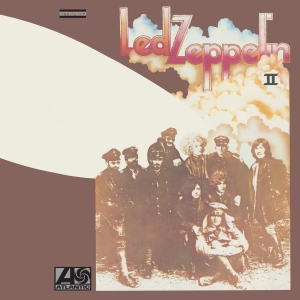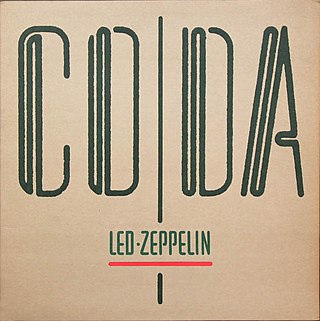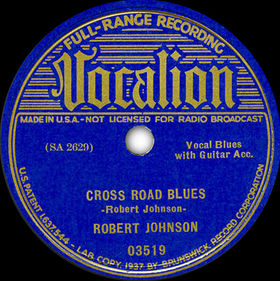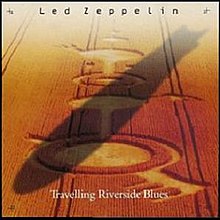
Slide guitar is a technique for playing the guitar that is often used in blues music. It involves playing a guitar while holding a hard object against the strings, creating the opportunity for glissando effects and deep vibratos that reflect characteristics of the human singing voice. It typically involves playing the guitar in the traditional position with the use of a slide fitted on one of the guitarist's fingers. The slide may be a metal or glass tube, such as the neck of a bottle. The term bottleneck was historically used to describe this type of playing. The strings are typically plucked while the slide is moved over the strings to change the pitch. The guitar may also be placed on the player's lap and played with a hand-held bar.

Led Zeppelin II is the second studio album by the English rock band Led Zeppelin, released on 22 October 1969 in the United States and on 31 October 1969 in the United Kingdom by Atlantic Records. Recording sessions for the album took place at several locations in both the United Kingdom and North America from January to August 1969. The album's production was credited to the band's lead guitarist and songwriter Jimmy Page, and it was also Led Zeppelin's first album on which Eddie Kramer served as engineer.

Coda is the first compilation album by the English rock band Led Zeppelin. The album is a collection of rejected tracks from various sessions during Led Zeppelin's twelve-year career. It was released on 19 November 1982, almost two years after the group had officially disbanded following the death of drummer John Bonham. The word coda, meaning a passage that ends a musical piece following the main body, was therefore chosen as the title.

Led Zeppelin is a boxed set by English rock band Led Zeppelin. It was the first compilation of songs by the band and the selection and remastering of the tracks were supervised by Jimmy Page. Atlantic Records released it on 8 October 1990 on several formats: four compact discs, six vinyl records, or four cassette tapes. A 36-page booklet was also included with the release.

"Black Dog" is a song by English rock band Led Zeppelin. It is the first track on the band's untitled fourth album (1971), which has become one of the best-selling albums of all time. The lyrics contain typical bluesman themes of lust, eroticism and betrayal. The song was released as a single and reached the charts in many countries. It is "one of the most instantly recognisable Zeppelin tracks", and was included in Rolling Stone's 500 Greatest Songs of All Time list (US), and ranked No. 1 in Q magazine's (UK) "20 Greatest Guitar Tracks".

"Trampled Under Foot" is a song by English rock group Led Zeppelin. A funk-influenced piece with John Paul Jones on clavinet, it was included on their 1975 album Physical Graffiti. The song was released as a single in several countries and was frequently performed in concert.

"You Shook Me" is a 1962 blues song recorded by Chicago blues artist Muddy Waters. Willie Dixon wrote the lyrics and Earl Hooker provided the instrumental backing; the song features Waters' vocal in unison with Hooker's slide-guitar melody. "You Shook Me" became one of Muddy Waters' most successful early-1960s singles and has been interpreted by several blues and rock artists.

"In My Time of Dying" is a gospel music song by Blind Willie Johnson. The title line, closing each stanza of the song, refers to a deathbed and was inspired by a passage in the Bible from Psalms 41:3 "The Lord will strengthen him upon the bed of languishing, thou wilt make all his bed in his sickness". Numerous artists have recorded variations, including Bob Dylan and Led Zeppelin.

"Cross Road Blues" is a song written by the American blues artist Robert Johnson. He performed it as a solo piece with his vocal and acoustic slide guitar in the Delta blues-style. The song has become part of the Robert Johnson mythology as referring to the place where he supposedly sold his soul to the Devil in exchange for his musical talent. This is based largely on folklore of the American South that identifies a crossroads as the site where such pacts are made, although the lyrics do not contain any references to Satan or a Faustian bargain.

Lee Roy Parnell is an American country music and blues artist, singer, songwriter, and guitarist. Active since 1990, he has recorded eight studio albums, and has charted more than twenty singles on the Billboard Hot Country Singles & Tracks charts. His highest-charting hits are "What Kind of Fool Do You Think I Am" (1992), "Tender Moment" (1993), and "A Little Bit of You" (1995), all of which peaked at No. 2. Four more of his singles have charted in the Top Ten as well. Parnell made a shift in the early 2000s back to the bluesier sounds of his early works, releasing two blues albums on Vanguard Records and Universal South. Besides his own work, Parnell has played slide guitar and National guitar on several other country and blues recordings.

"Killing Floor" is a 1964 song by American blues singer-songwriter and guitarist Howlin' Wolf. Called "one of the defining classics of Chicago electric blues", "Killing Floor" became a blues standard with recordings by various artists. It has been acknowledged by the Blues Foundation Hall of Fame, which noted its popularity among rock as well as blues musicians. English rock group Led Zeppelin adapted the song for their "The Lemon Song", for which Howlin' Wolf is named as a co-author.

"Rollin' and Tumblin'" is a blues standard first recorded by American singer-guitarist Hambone Willie Newbern in 1929. Called a "great Delta blues classic", it has been interpreted by hundreds of Delta and Chicago blues artists, including well-known recordings by Muddy Waters. Rock musicians usually follow Waters' versions, with the 1960s group Cream's rendition being perhaps the best known.

"Dust My Broom" is a blues song originally recorded as "I Believe I'll Dust My Broom" by American blues artist Robert Johnson in 1936. It is a solo performance in the Delta blues-style with Johnson's vocal accompanied by his acoustic guitar. As with many of his songs, it is based on earlier blues songs, the earliest of which has been identified as "I Believe I'll Make a Change", recorded by the Sparks brothers as "Pinetop and Lindberg" in 1932. Johnson's guitar work features an early use of a boogie rhythm pattern, which is seen as a major innovation, as well as a repeating triplets figure.

Shades of Two Worlds is the tenth studio album by the Allman Brothers Band. Among the tracks are several longer songs of varying genres: the rock song "Nobody Knows"; jazzy instrumental "Kind of Bird"; and the blues-rocker "Get On with Your Life". Dickey Betts wrote or co-wrote five of the eight songs. Newer member Warren Haynes also has co-writing credits on five songs, while namesake Gregg Allman is only credited on two songs. There is also a Delta Blues cover of Robert Johnson's "Come On in My Kitchen".

BBC Sessions is a compilation album featuring studio sessions and a live concert recorded by English rock group Led Zeppelin for the BBC. It was released on 17 November 1997, by Atlantic Records. Disc one consists of material from four different 1969 BBC sessions. Disc two contains most of the 1 April 1971 concert from the Paris Theatre in London. Disc three was only included in a limited run of album releases and features rare interviews from 1969, 1976/1977, and 1990.

"The Girl I Love She Got Long Black Wavy Hair" is a song performed by English rock band Led Zeppelin. It was recorded by the BBC on 16 June 1969 for Chris Grant's Tasty Pop Sundae show during the band's UK Tour of Summer 1969 and was broadcast on 22 June 1969. The song was later included on the live Led Zeppelin album BBC Sessions, released in 1997. It is the only known performance of the song by the band.

Stone Blue is the seventh studio album by English rock band Foghat, released in May 1978 on Bearsville Records. "Stone Blue" paired Foghat with producer Eddie Kramer, who had previously engineered recordings for Jimi Hendrix and Led Zeppelin. Kramer and Foghat did not collaborate smoothly, but the tension in the studio may have helped to give the album an added edge. Besides the title track, "Stone Blue" contained a ferocious cover of Robert Johnson's "Sweet Home Chicago," reasserting the band's blues credentials.

"It's Nobody's Fault but Mine" or "Nobody's Fault but Mine" is a song first recorded by gospel blues artist Blind Willie Johnson in 1927. It is a solo performance with Johnson singing and playing slide guitar. The song has been interpreted and recorded by numerous musicians in a variety of styles, including Led Zeppelin on their 1976 album Presence.

"Over the Hills and Far Away" is the third track from English rock band Led Zeppelin's 1973 album Houses of the Holy. In the US, it was released as a single, with "Dancing Days" as the B-side.



















